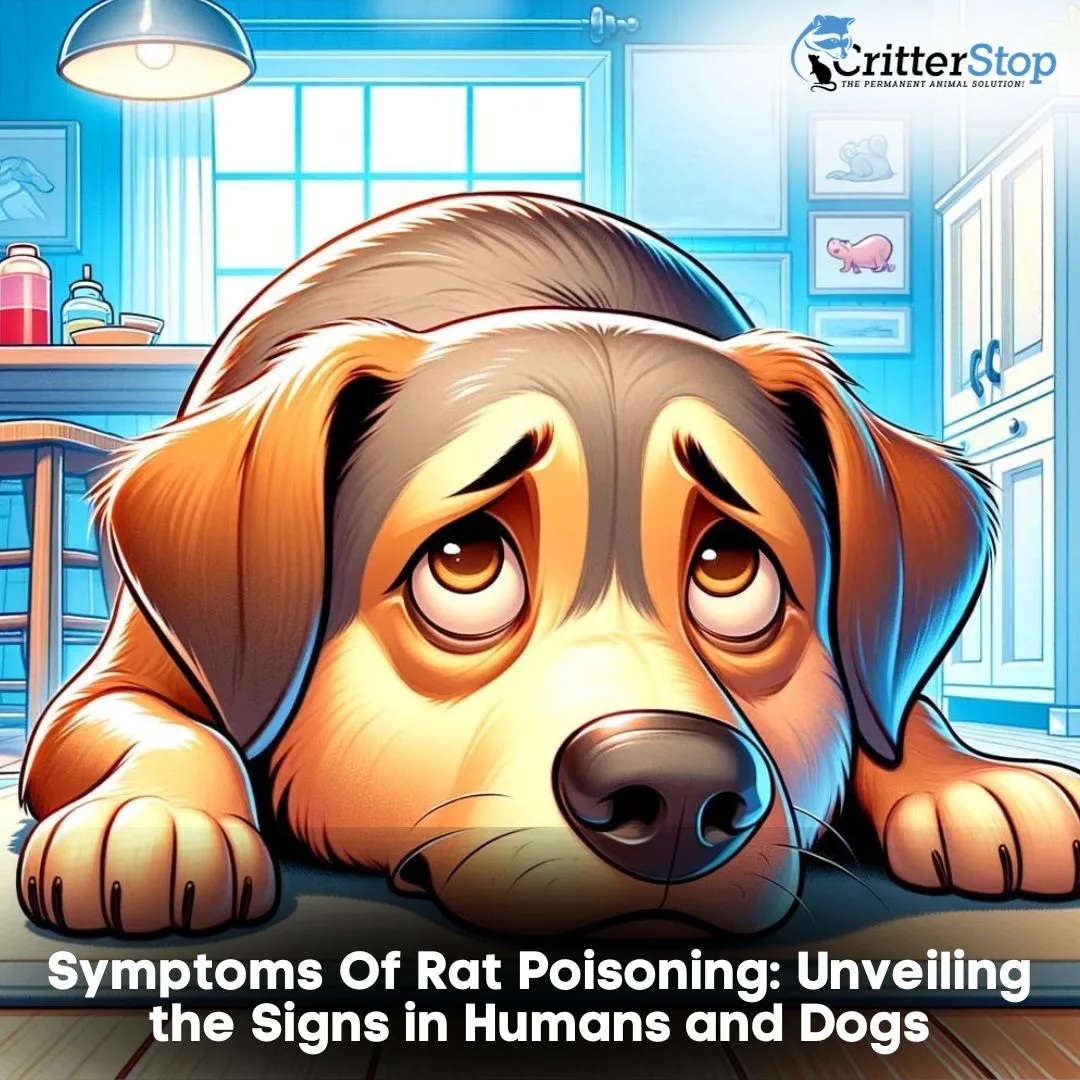
Rat poisoning refers to the ingestion of substances designed to eliminate rodents but inadvertently affecting other animals, including humans and dogs. Chemicals like phosphide, bromethalin, and strychnine, known as rodenticides, contain toxic components that can lead to various symptoms and health issues.
Rat poisoning symptoms can vary based on the type of rodenticide ingested, the quantity, and the individual's health. Understanding these symptoms is crucial for timely intervention and appropriate medical care.
Stay tuned with our expert team from Critter Stop as we delve into specific symptoms observed in humans and dogs, shedding light on the signs that demand attention and care.
In the initial stages of rat poisoning, the patient might experience persistent nausea and frequent vomiting. These symptoms are the body's immediate response to ingesting toxic substances commonly found in rat poison. The aim is to expel harmful elements causing digestive distress.
Diarrhea is another common symptom of rat poisoning. The toxic components disrupt normal digestive function, resulting in loose and watery stools. The severity of diarrhea can vary based on the amount and type of poison ingested. It is also important to know the age of the patient, the poison effect in a child could be visible in a few minutes, causing even death. In an adult, could take a few hours to get complicated.
Abdominal pain is a prevalent discomfort associated with rat poisoning. The toxic effects on internal organs, particularly the gastrointestinal system, can cause varying degrees of abdominal pain, including cramping, sharp pains, or a generalized ache.
Rat poisoning often leads to a significant loss of appetite. The toxic substances interfere with normal hunger and satiety signals, resulting in a diminished desire to eat. This contributes to weight loss over time.
Prolonged exposure to rat poison can result in noticeable weight loss. The toxic impact on the body's systems can lead to metabolic changes and a decreased ability to absorb nutrients from food.
General weakness and fatigue are common symptoms that accompany rat poisoning. The body expends significant energy in its attempt to counteract the toxic effects, leading to an overall sense of weakness and tiredness.
Uncontrolled muscle tremors are a neurological manifestation of rat poisoning. The toxic substances impact the central nervous system, leading to disruptions in normal muscle function.
Seizures represent a severe consequence of rat poisoning and demand urgent medical attention. The toxic impact on the nervous system can lead to abnormal electrical activity in the brain, triggering seizures.
If you experience any of these symptoms, seek medical attention promptly. Rat poisoning is a serious condition that requires professional intervention.
Rashes:
Some individuals might develop skin rashes as a reaction to exposure to rat poison. This can be due to an allergic reaction to the substance.
When we have provided our rat extermination services, we have found that the DIY approach is normally more problematic for homeowners than hiring a professional team like us. The risk of manipulating these chemicals is very high, reason wich we always recommend calling experts to handle this situation.

Experiencing persistent headaches could be an indicator of the neurological impact of rat poison on the central nervous system. These headaches may vary in intensity and may persist, signaling potential disruption in the normal functioning of the brain.
Dizziness is another symptom that individuals might encounter. This could affect balance and coordination, making simple tasks challenging. If you find yourself feeling consistently dizzy, it's crucial to consider it as a potential symptom of rat poisoning.
Confusion is a concerning neurological symptom that may develop as the brain contends with the toxic effects of rat poison. Individuals might find it challenging to think clearly, make decisions, or remember basic information, indicating a serious impact on cognitive function.
The development of slurred speech is a clear manifestation of neurological impairment. Rat poison's impact on the central nervous system might interfere with the coordination of speech muscles, resulting in slurred or unclear speech patterns.
Observing unusual behavior in yourself or others, such as disorientation or acting out of character, could be linked to rat poisoning. The toxic effects on the brain may lead to alterations in behavior, emphasizing the importance of seeking medical attention if such changes are noted.
These neurological symptoms are critical indicators of potential rat poisoning and should not be ignored. If you or someone you know experiences these symptoms, seek immediate medical attention for a proper diagnosis and treatment.
Understanding these points underscores the critical nature of seeking professional medical evaluation and treatment in cases of suspected rat poisoning. The potential complications highlight the importance of addressing rat poisoning promptly to ensure the best possible outcome for one's health.
Understanding these blood-related symptoms is crucial for recognizing the severity of rat poisoning. If someone exhibits these symptoms, seeking immediate medical attention is imperative to ensure proper diagnosis and intervention. Rat poisoning can have serious consequences, and timely medical care is vital for the best possible outcome.
When it comes to dogs, it is imperative for pet owners to be well-versed in potential physical symptoms that could signify rat poisoning. In the unfortunate event that you harbor suspicions that your dog might have ingested rat poison, it becomes paramount to be vigilant for the following signs:
If you notice any of these distressing symptoms in your canine companion and suspect rat poisoning, it is of utmost importance to promptly seek professional veterinary attention. Early detection and timely intervention play a pivotal role in securing a better prognosis for your beloved pet.

In cases of suspected rat poisoning in dogs, attentive observation for potential neurological symptoms is crucial. These symptoms not only indicate possible neurological impact but also underscore the urgency of the situation. Here's a breakdown of these neurological symptoms:
If your dog displays any of these concerning neurological symptoms and rat poisoning is suspected, seeking immediate veterinary attention is imperative. Neurological symptoms often require swift intervention to mitigate potential complications and ensure the best possible outcome for your beloved pet. Early detection and proactive measures play a pivotal role in addressing the complexities associated with neurological distress induced by rat poisoning.
In cases of suspected rat poisoning in dogs, it's essential to be aware of potential internal organ damage. Rat poison toxicity can have severe consequences on various organs. Here's an overview:
Recognizing the signs of internal organ damage is critical for timely intervention. If you suspect rat poisoning in your dog and observe symptoms related to liver or kidney issues, or indications of respiratory distress, seek urgent veterinary care. Prompt action is crucial for mitigating the impact on internal organs and ensuring the best possible outcome for your pet.
Suspecting rat poisoning in dogs warrants attention to potential blood-related symptoms, indicating the severity of the toxic effects. Here are key blood-related symptoms to be mindful of:
Recognizing these blood-related symptoms is vital for timely intervention. If you suspect rat poisoning and observe signs of anemia, low blood pressure, or bleeding, seek urgent veterinary care. Swift action is crucial for addressing the blood-related complications and ensuring the best possible outcome for your canine companion.
Contact poison control immediately or veterinary attention if rat poisoning is suspected. Treatment effectiveness depends on the promptness of intervention and the specific circumstances of poisoning.

Whether you're concerned about your furry friend, a fellow human, or feline companions, this FAQ guide provides insights into the diverse symptoms associated with rat poisoning. From early signs to the critical steps of seeking professional help, explore the answers to common questions regarding the rat poison symptoms in humans, dogs and cats. Stay informed to safeguard the well-being of your loved ones and pets.
A: Common symptoms of rat poisoning in a dog include lethargy, weakness, pale gums, difficulty breathing, and unexplained bleeding. Immediate veterinary attention is crucial if you suspect poisoning.
A: Symptoms of rat poisoning in humans may include nausea, vomiting, abdominal pain, and, in severe cases, bleeding. Seek medical help promptly if exposure is suspected.
A: Rat poisoning symptoms in cats may mirror those in dogs and can include lethargy, difficulty breathing, and bleeding. Consult a veterinarian if you observe any concerning signs.
A: Symptoms in humans may range from gastrointestinal issues like nausea to severe complications such as internal bleeding. Seek immediate medical attention if rat poisoning is suspected.
A: Rat poison symptoms in dogs encompass lethargy, loss of appetite, difficulty breathing, and bleeding. Swift veterinary intervention is vital for the best outcome.
A: Signs include weakness, pale gums, and bleeding. If your dog displays these symptoms, contact a vet promptly for a thorough examination and treatment.
A: Early symptoms may include lethargy, loss of appetite, and weakness. Early detection and veterinary care enhance the chances of successful treatment.
A: Symptoms of consuming rat poison can range from gastrointestinal distress to severe bleeding. Seek immediate medical attention for proper diagnosis and treatment.
A: The danger of consuming rat poison varies, and even a small amount can be harmful. If ingestion is suspected, don't think about how much rat poison has been injested, instead seek immediate medical or veterinary assistance.
A: Yes, contact your local poison control center or an emergency vet hotline if someone or a pet ingests rat poison. Swift action is crucial for a positive outcome.
A: Before we named a few: phosphide, bromethalin, and strychnine. But there are others: zinc, warfarin, and cholecalciferol. Other chemicals like arsenic, barium, and thallium, despite being used to deal with other critters, are not commonly used for rodents.
A: Contact poison control immediately. Do not wait for symptoms. They will guide you on the necessary steps for a rapid and effective response.
Remember, early detection and professional guidance are crucial for addressing rat poisoning symptoms in both pets and humans. If you suspect poisoning, seek medical or veterinary help promptly.
Rat poisoning poses a significant threat to both humans and animals, emphasizing the importance of proactive prevention. Prioritizing preventive measures such as using baits and traps, sealing entry points, putting this rodenticide in a safe place, and practicing proper food storage substantially reduces the risk of exposure to dangerous toxins. These strategies contribute to fostering a safer living environment, prioritizing the well-being of households and pets.
Vigilance, swift action in case of suspected poisoning, and seeking professional guidance are essential components of effective prevention and mitigation strategies. By adopting these measures, you contribute to creating a home that is not only rodent-free but also safe for everyone who resides within.
As rodent removal experts, at Critter Stop we have provided thousands of services related to mice and rats. We believe that hiring a professional team of extermination would be safer for you, your family, and your pets than handling these toxic chemicals by yourself. If you need a hand on this, we are ready to pick up your call at (214) 234-2616.
Visit our Critter Library and learn more about our furry friends